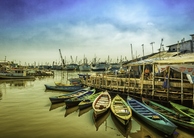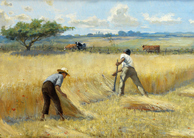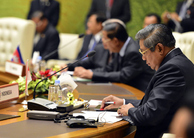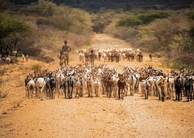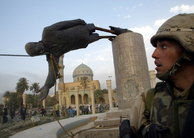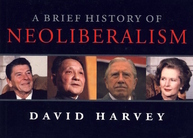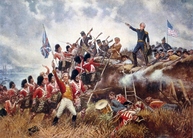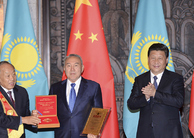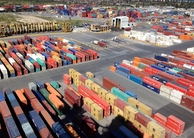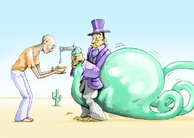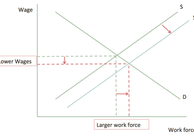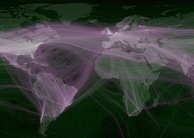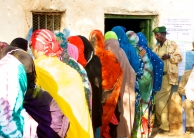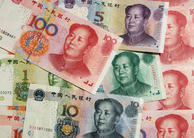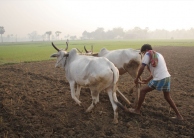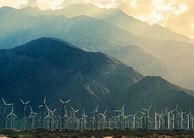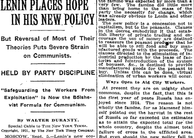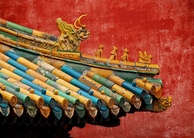|
Eco (tagged articles)
The keyword Eco is tagged in the following 140 articles.
2021, Vol. 13 No. 11
It has recently been argued that longtermism it at odds with capitalism. It is said that while longtermism places great emphasis on the value of far future benefits, capitalism neglects the future by favouring short-term gains. Therefore, those... Read Article »
2021, Vol. 13 No. 10
Early medieval Irish society operated on an elaborate power structure formalized by law, practiced through social interaction, and maintained by tacit exploitation of the lower orders. This paper investigates the materialization of class hierarchies... Read Article »
2021, Vol. 13 No. 09
Most analysts agree that China’s Belt and Road Initiative (BRI) is set to b Ecome a defining feature of the global Economy of the 21st century. However, there is wide-ranging debate about how to understand the BRI. Is it a top-down “grand... Read Article »
2021, Vol. 13 No. 09
The COVID-19 crisis has exacerbated current global challenges. However, this article argues that this time of crisis can also be a unique opportunity for the existing global Economic institutions - G20, WTO, IMF, and World Bank (WB) - to make the... Read Article »
2021, Vol. 13 No. 05
Some scholars of American history suggest the institution of slavery was dying out on the eve of the Civil War, implying the Civil War was fought over more generic, philosophical states' rights principles rather than slavery itself. Economic evidence... Read Article »
2021, Vol. 13 No. 02
This paper will attempt to link fundamental ideas and terms of environmental sociology in the context of Ecotourism relating to human society and conceptions of nature. Furthermore, connections to neo-Marxist and neo-Gramscian theories will be made... Read Article »
2021, Vol. 13 No. 01
The Civil War was a seminal moment in the historical development in the United States. The American Revolution may have created the U.S. as a sovereign nation, but the Civil War helped to determine what kind of nation America would b Ecome. The R Econstruction... Read Article »
2020, Vol. 12 No. 11
This work aims to integrate postcolonial scholarship into some basic theoretical foundations of a mainstream Economic curriculum. Noting the insufficiencies of neoclassical Economics to deal with problems of cultural difference and priority, the... Read Article »
2020, Vol. 12 No. 10
Centuries of subjugation under Spanish and American colonial rule have embedded an idealistic view of white beauty in the minds of Filipinos. It continues to be deeply rooted in Philippine culture due to the constant exposure of Filipina bodies... Read Article »
2020, Vol. 12 No. 10
This paper presents a comparative analysis of Oedipus at Colonus, a play written by the ancient Greek tragedian Sophocles, and Gran Torino, an American film directed by Clint Eastwood. The two literary productions, although remote as they seem,... Read Article »
2020, Vol. 12 No. 09
Recent work with the Economic Complexity Index (ECI) has shown that a country’s productive structure constrains its level of Economic growth and income inequality. Building on previous research that identified an increasing gap between Latin... Read Article »
2019, Vol. 11 No. 01
Globalization is generally studied as a process that extensively impacts nations and peoples across every aspect of society. Empirical and theoretical research largely focuses on this effect, seeking to discover the impact of an increasingly globalized... Read Article »
2018, Vol. 10 No. 10
Medical Debt has largely been viewed as a financial burden. While studies have linked Medical Debt to decreased savings, reduced health access, foreclosure of homes, and loss of income, there has been little to no research exploring Medical Debt... Read Article »
2018, Vol. 10 No. 10
The value proposition in the commercial setting is the functional relationship of quality and price. It is held to be a utility maximizing function of the relationship between buyer and seller. Its proponents assert that translation of the value... Read Article »
2018, Vol. 10 No. 03
On February 14th, 1965, just one week before he was assassinated, Malcolm X delivered a speech in Detroit. He spoke about his beliefs concerning segregation and civil rights, and made a point of contextualizing the civil rights movement globally... Read Article »
2018, Vol. 10 No. 03
Devastated by an Economic collapse at the end of the 20th century, Japan’s Economy entered a decade long period of stagnation. Now, Japan has found stable leadership, but attempts at new Economic growth have fallen through. A combination of... Read Article »
2017, Vol. 11 No. 1
The growth of the South Korean Economy has often been attributed to the rise of Chaebols, or family owned businesses with wide-ranging conglomeratelike Economic interests. The embeddedness of the Chaebol in Korea's political Economy has allowed... Read Article »
2017, Vol. 11 No. 1
This article examines the reasons why racism persists in Cuba more than fifty years after the 1959 Revolution in which Fidel Castro promised Afro-Cubans to eradicate racism from the island. More specifically, it investigates Cuba's racist history... Read Article »
2017, Vol. 11 No. 1
By using an incentives/disincentives model to map the divergent behaviors of multinational corporations (MNCs) confronted by a sanctioned Economy, I explain why some Economic sanctions work better than others at achieving their desired political... Read Article »
2017, Vol. 9 No. 11
This research project focuses on invasive aquatic species and their potential usage as biological weapons. It’s a cross disciplinary study which utilises a comprehensive literature review on invasive aquatic species, biological warfare, maritime... Read Article »
2017, Vol. 9 No. 10
During the periods of the Agrarian Revolt and the 1920s, farmers were unhappy with the Economic conditions in which they found themselves. Both periods witnessed the ascent of political movements that endeavored to aid farmers in their Economic... Read Article »
2017, Vol. 9 No. 05
Is it possible to objectively define the Anthropocene? This essay argues that whether or not it is precisely definable as a geological epoch, its true value, as a concept grounded in futurity, lies within the social realm. The origins of the term... Read Article »
2017, Vol. 7 No. 2
In 2009, Brazil was in the path to b Ecome a superpower. Immune to the Economic crises of 2008, the country's Economy benefitted from the commodity boom, achieving a growth rate of 7.5 per cent in 2010, when Rousseff was elected. A few years later... Read Article »
2017, Vol. 9 No. 04
Since the end of the S Econd World War, scholars of British military history have busied themselves with attempts to explain the British defeat at Singapore to Japan in February 1942. Research reveals that there existed what Peden has called an &... Read Article »
2017, Vol. 9 No. 03
The Obama presidency will largely be defined by the administration’s ability to respond to the unique and historic challenge facing the country at the time of his inauguration: the Great Recession. This paper evaluates the president’... Read Article »
2017, Vol. 9 No. 02
This study examines the effects of the Dodd-Frank Act on community banks in the Northeastern region of the United States. Using annual financial data from years 2010 to 2014 gathered on 82 banks, a regression equation is estimated using the Generalized... Read Article »
2017, Vol. 9 No. 01
Argentina’s Economic policies under Nestor Kirchner and Cristina Fernández de Kirchner were hugely impactful in the country’s r Ecovery and general development, yet the Kirchner administrations are often painted with the same broad... Read Article »
2016, Vol. 7 No. 1
According to the International Centre for Prison Studies, the number of women in prisons in Latin America has almost doubled since the 1990s. Most women in prison are incarcerated for drug related crimes, and although women are still a minority... Read Article »
2016, Vol. 8 No. 12
Biochar is biomass that has been converted into charcoal through the pyrolysis process. Biochar is applied into soils for carbon sequestration or for improving soil fertility. The carbon bonds in biochar are very stable and do not break down easily... Read Article »
2016, Vol. 10 No. 1
Economic regionalism has been an observable phenomenon worldwide. Many countries around the world pursue some degree of Economic integration with neighbouring countries, in the hopes of capitalizing on the benefits of such an arrangement. At the... Read Article »
2016, Vol. 10 No. 1
Labor markets have traditionally been regarded as the product of a demand and supply of labor.2 In Varieties of Capitalism: The Institutional Foundations of Comparative Advantage, political Economists Peter A. Hall and David Soskice put forth two... Read Article »
2016, Vol. 10 No. 1
We met Scott and Kerstin on different sides of the Atlantic. I met the former in Philadelphia on my way to a convenience store in the early hours of a busy morning when my work schedule benefited from a short coffee break. Håvard met Kerstin... Read Article »
2016, Vol. 2016 No. 2
Dams have been used for centuries to assist with the development of human civilization. Access to drinking water, flood control and agricultural irrigation are historical reasons for the development of dams and river impoundments. The abundance... Read Article »
2016, Vol. 6 No. 1
For the past four decades, pastoralist activities have been pushed to marginal areas in several regions of Ethiopia. This change was initiated by the Agrarian Land Reform Proclamation of 1974. Pastoralist activities prior to the agrarian reforms... Read Article »
2016, Vol. 8 No. 06
In their search for a new development paradigm, many African governments and international organizations have reverted to cooperatives, a distinct business model that manifest a turbulent history ranging from pre-colonial to colonial and post-independence... Read Article »
2016, Vol. 6 No. 2
The efficacy of efforts by the United States government to influence regime change in foreign nations has been increasingly called into question. Motivated by these statements of skepticism, the study herein provides a statistical analysis of the... Read Article »
2016, Vol. 6 No. 2
This paper explores the role of public institutions in reducing or fostering neighborhood violence and crime. Understanding institutional density as a neighborhood effect, this paper examines how ten public institutions and structures influence... Read Article »
2016, Vol. 3 No. 1
The paper “Does Trade Liberalization Lead to Declining Fish Stock Health? Analyzing the Causality” by Erin K. Glenn has been removed from this volume. The editorial board of The Developing Economist decided to withdraw this article... Read Article »
2016, Vol. 3 No. 1
Using data from the National Longitudinal Survey of Youth 1997, I estimate a multinomial logit choice model for the college major decisions of first-generation college students|students who are the first in the families to attend college|and non... Read Article »
2016, Vol. 8 No. 04
There has been a shift away from the traditional adversarial criminal justice system and towards a victim centered system. The effects of this shift can be seen in talk of “closure” as a justification for the death penalty, the use of... Read Article »
2016, Vol. 8 No. 04
Social and Economic wellbeing are not simply determined by the choices one makes. Social class and poverty display consistent patterns across groups and generations making social mobility and Economic success difficult in individual lives. But there... Read Article »
2016, Vol. 8 No. 03
Fear finds its place in the world through numerous forms, including natural disasters, genocide, war, trauma and countless other events which present lasting effects in the lives of those who maintain r Ecollection. The research concerning the alteration... Read Article »
2016, Vol. 8 No. 02
At 7am in the morning after the Referendum on Scottish Independence, a triumphant David Cameron stood on the steps of number 10 Downing Street and announced to the world that the Scottish people had, with 55% of the electorate voting No, comprehensively... Read Article »
2016, Vol. 8 No. 02
Mammal migration between seasonal ranges can consist of relatively short distance migrations of a single individual as well as massive migrations involving thousands of individuals in a population. Understanding the varying migratory habits among... Read Article »
2016, Vol. 8 No. 02
Michael Thompson, reviewing A Brief History of Neoliberalism by David Harvey, calls it ‘the world according to David Harvey’ (2005). This is an accurate remark: although erring slightly on the side of conspiracy, the book is a breathtaking... Read Article »
2016, Vol. 8 No. 02
The Patient Protection and Affordable Care Act of 2010 called upon states to expand Medicaid, a subsidized health insurance program, for individuals making up to effectively 138 percent of the federal poverty line. The rapidly growing HIV-positive... Read Article »
2016, Vol. 2016 No. 1
Using Clayoquot Sound as a reference, the consequences clear-cut logging has on the coastal temperate rainforest Ecosystems was examined. Social and political outcomes from extensive protests in 1993, which opposed the destruction of the natural... Read Article »
2016, Vol. 2016 No. 1
This paper explores the differing effects that conventional and organic agriculture have on soil Ecosystems. The findings are primarily based on a review of published literature found in journal articles and government reports. Conventional agriculture... Read Article »
2016, Vol. 2016 No. 1
This paper provides a holistic overview of the effects of engineered and natural nanomaterials (ENMs and NNMs) in the environment. Through increasing production and technology, NMs are contaminating the air, soil, and water with large toxicological... Read Article »
2016, Vol. 8 No. 01
While the overall focus of most scholarships related to the 32-month War of 1812 concentrates on the war’s political and military history, it is also imperative to examine how scholars and historians framed its Economic contexts. In particular... Read Article »
2015, Vol. 5 No. 1
Overcoming the threats of the snow leopard with immediate action may be what will save this species from extinction. This report provides a brief overview both of the challenges faced by the snow leopard and the roles local people have taken in... Read Article »
2016, Vol. 9 No. 1
Founded in 1967, the Association of Southeast Asian Nations (ASEAN) is one of the most prominent intergovernmental organizations in Asia. ASEAN's main achievement has been to unite ten countries in Southeast Asia through shared goals of regional... Read Article »
2016, Vol. 9 No. 1
The New Silk Road, formally termed the Silk Road Economic Belt and also known as the "One Belt, One Road," was first proposed by China's President Xi Jinping during his 2013 visit to Central Asia. This initiative aims to revive the historical vitality... Read Article »
2015, Vol. 6 No. 1
This paper examines the potential effect of decreasing honeybee population on crop prices by estimating the relationship between honeybee population and the price of almonds over time. As a declining honeybee population b Ecomes an increasingly salient... Read Article »
2015, Vol. 6 No. 1
This paper investigates the relationship between various types of Economic freedom and intra-EMU export growth. Export growth is the primary empirical puzzle that this paper seeks to explicate, and is important because the EMU's inception preceded... Read Article »
2015, Vol. 7 No. 12
The terrestrial Mojave Shoulderband Snail (Helminthoglypta (Coyote) greggi) is being considered for status and protection as an endangered species under the Endangered Species Act due to the recent construction of a mining operation in an area that... Read Article »
2015, Vol. 7 No. 12
This study focuses on the relationship between prior foodservice experience and a person’s tipping behavior. Using data from a survey of 500 University of Maryland undergraduate students, an analysis is completed by regressing restaurant experience... Read Article »
2015, Vol. 7 No. 11
An article in The Guardian last month reported on the extreme and increasing levels of wealth inequality that exist in Britain today.[1] The story cited an Oxfam report that highlighted the opulent existence of Britain’s richest family, the... Read Article »
2015, Vol. 7 No. 10
Using data collected through field research at Tyler State Park in Pennsylvania, this study examines the characteristics of Woodchuck (Marmota monax) burrows along a creek tributary. This study finds that there is a robust positive correlation between... Read Article »
2015, Vol. 7 No. 09
Energy researchers have recently taken interest in the use of switchgrass (Panicum virgatum) as a biofuel. Arbuscular mycorrhizal fungi (AMF), which are known to increase plant acquisition of nutrients through a symbiotic relationship, may be used... Read Article »
2015, Vol. 7 No. 09
Many U.S. coastal resort areas with high amenity values have experienced a high influx of both residents (full-time and part-time) and vacationers over the last two decades. This is the case for the Outer Banks of North Carolina, a narrow barrier... Read Article »
2015, Vol. 7 No. 07
With the departure of international forces and the exit of Hamid Karzai, Afghanistan has entered a new age. While Afghanistan’s GDP has quintupled to $20 billion since 2002, the war-torn country remains one of the world’s most impoverished... Read Article »
2015, Vol. 7 No. 06
The 1937 Recession is a lesser-known event overshadowed by the Stock Market Crash of 1929 and the Great Depression. Nonetheless, it is a subject of deep interest because it brought about an uncommonly sharp Economic downturn during the depression... Read Article »
2015, Vol. 7 No. 06
The concept of a “fourth estate” was first articulated by John Declare, editor of The Times in an article published in 1853. He believed the press had a crucial role to play in British society’s transformation into a representative... Read Article »
2015, Vol. 11 No. 2
To maintain sodium (Na+) homeostasis in a hypotonic environment, freshwater teleosts must constantly absorb Na+ through their gills. Teleosts in temperate climates have the extra challenge of living in an environment in which ambient temperatures... Read Article »
2015, Vol. 2 No. 1
In the present paper, reputation is approached as an idea involving status. We consider a multiproduct monopolist's product line and pricing decisions under the explicit assumption of two status externalities. The firm sells a low-end product and... Read Article »
2015, Vol. 7 No. 03
The use and effectiveness of capital controls in emerging market Economies is important to examine because of the potentially damaging effects that these controls may have on a country’s Economic growth and development, especially if the country... Read Article »
2015, Vol. 7 No. 03
Concern regarding the inequity and commodification apparently necessary for the capitalist system to thrive is not new. Marx, in his work Capital: Critique of Political Economy (1867), raised the idea of the fallibility of fetishism, including an... Read Article »
2015, Vol. 7 No. 02
Our contemporary global public sphere is made up of a tiny proportion of the world’s population. Affluent, exclusive, and concerned only with perpetuating its own Economic advancement, this contemporary global public sphere is an anachronism... Read Article »
2015, Vol. 7 No. 01
The majority of oil extracted from the Alberta oil sands is processed, diluted, and then sold to the US. The implications that arise from the oil sands production are a litany of health, environmental, and Economic concerns. Despite all the implications... Read Article »
2014, Vol. 6 No. 10
In July 2012, Spain's unemployment rate was above 20%, its stock market was at its lowest point in a decade, and the government was borrowing at a rate of 7.6%. With domestic demand depleted and no sign of r Ecovery in sight, President Mariano Rajoy... Read Article »
2014, Vol. 6 No. 09
Higher education in the UK has experienced radical change over the last two decades. As a result of the increased supply of university graduates, bachelor’s degrees no longer function as a good signal to employers and more individuals are... Read Article »
2014, Vol. 6 No. 09
The Saudi Economy is one of the most robust Economies in the world. As “one of the best performing G-20 Economies in recent years” (IMF), Saudi Arabia’s growth in real Gross Domestic Product (GDP) came in third after China and... Read Article »
2014, Vol. 6 No. 06
The issue of foreign labor in Saudi Arabia is now one that touches all corners of the globe. Since 30% of Saudi Arabia's population of 27.3 million are immigrants from other countries, changes in Saudi labor laws affect not only the workers but... Read Article »
2014, Vol. 4 No. 2
Prospect theory, a behavioral Economic theory first proposed by David Kahneman and Amos Tversky in 1979, has evolved into a seminal theory on risk decision-making applicable in a wide range of fields. Yet in both political science and international... Read Article »
2014, Vol. 4 No. 2
This paper investigates factors that contribute to the effectiveness of international Economic sanctions. A review of existing literature on sanctions reveals that scholars of Economic statecraft have largely neglected to consider two variables &... Read Article »
2014, Vol. 6 No. 03
The creation of western-style government institutions has been unsuccessful in Somalia. This is a direct result of colonial administrations not laying the proper foundation for western government institutions to achieve legitimacy in a culture of... Read Article »
2013, Vol. 3 No. 1
Over the past several decades, with the introduction of Ecology as a scientific pursuit, China has made advancements in ensuring the health and sustainability of its forests and biodiversity. A very large number of endemic plant and vertebrate species... Read Article »
2013, Vol. 3 No. 1
In his 2011 book, Eco-Innovators: Sustainability in Atlantic Canada, environmental journalist Chris Benjamin provides a new kind of roadmap to a more sustainable future. In this work, Chris masterfully weaves the stories of 35 creative and dedicated... Read Article »
2013, Vol. 4 No. 1
After years of Economic downturn and r Ecovery, the debate over stimulus packages and countercyclical policy continues globally. Proponents of such policies claim that the various stimulus packages and policy initiatives around the globe helped bring... Read Article »
2014, Vol. 10 No. 1
In order to determine the current state of the industrial food system, both a quantitative survey and a qualitative interview were conducted and administered to various food corporations in the United States. These surveys assessed the corporations... Read Article »
2008, Vol. 4 No. 1
Gavialis gangeticus, the Indian gharial, is the only extant gharial species in the world. The gharial is a large crocodilian in the family Gavialidae and is characterized by a long snout. Due to its sparse numbers and increased habitat destruction... Read Article »
2008, Vol. 5 No. 1
This case study focuses on the effects of avian introductions into a captive exhibit. Two hummingbirds, Colibri coruscans (sparkling violet eared) and Anthracothorax prevostii (green breasted mango), were both observed over an 8 week period as they... Read Article »
2009, Vol. 5 No. 2
The deer browsing effects on the regeneration of woody plants in forested Ecosystems is not fully understood. More can be learned by clipping plants in specific ways to mimic some aspect of a deer browsing regimen, especially intensity. Additionally... Read Article »
2013, Vol. 3 No. 2
The following is a case study of the author’s country of origin, Romania, and its journey back to sustainable living. Her article describes, outlines, and explains how Romania has undergone change with respect to its approach to sustainable... Read Article »
2013, Vol. 5 No. 09
This study investigates the behavior of the labor supply of Canadian women at different composite hourly wages of all paid jobs in 2009. Since it is widely demonstrated in the literature that variables such as age and levels of education, as well... Read Article »
2013, Vol. 5 No. 09
From his inauguration in 2005 to the end of his presidency in 2012, Mexican President Felipe Calderon presided over one of the most violent periods in his country’s history. Making good on one of his election promises, Calderon unleashed the... Read Article »
2013, Vol. 5 No. 09
The quest for Economic supremacy has been at the heart of the European integration process since its very inception. Tracing the historical origins of the Economic progress agenda, Europe’s ambition to bolster its Economy vis-à-vis... Read Article »
2013, Vol. 5 No. 08
This report examines the Chinese Economic model, the potential for future Chinese growth, and the implications for Australia. An examination of factors that have contributed to the rise of the modern Chinese Economy including demographic factors... Read Article »
2013, Vol. 3 No. 1
Given the importance of the global defense trade to geopolitics, the global Economy, and international relations at large, this paper examines the political Economy of the U.S. defense industry. The goal of this study is to determine the extent... Read Article »
2013, Vol. 5 No. 04
Corruption is damaging in almost every Economic aspect, but it can play a crucial role in the dynamics of political changes and reforms. Examination of corruption’s effect in the Economic reforms of China during the 1980s reveals that corruption... Read Article »
2013, Vol. 5 No. 03
This essay examines the first black winner in 2012 on Idols SA, Khaya Mthethwa (Appendix 1), the TV format of the Idol brand, and the social construction of racialized vision in the context of South Africa as a post-colonial nation from a visual... Read Article »
2012, Vol. 4 No. 12
This study asks the question of why minorities are so overrepresented among the homeless, with a focus on the United States and Europe in a comparative perspective. I combine Charles Tilly’s theoretical model on how to challenge durable inequality... Read Article »
2012, Vol. 6 No. 1
Seymour M. Lipset dubbed Economic development a “social requisite to democracy,” considering factors such as national wealth, a large degree of industrialization, and high levels of education to be necessary fertilizers to prepare a... Read Article »
2012, Vol. 4 No. 11
It has been argued that the global trading system is supposed to promote global efficiency and growth, but a rising chorus of voices is asserting that the global Economy operates in a way that is fundamentally unfair and seems to be ‘rigged... Read Article »
2012, Vol. 4 No. 08
Nelson Mandela once said, "You can never have an impact on society if you have not changed yourself." This quote is particularly applicable to the field of energy, and the transition from an unsustainable fossil fuel consuming world, to one based... Read Article »
2012, Vol. 4 No. 07
The “Great Recession” of 2008 resulted in unprecedented levels of state deficit spending.[1] However, even though deficits are partly the result of Economic forces beyond the control of state governments—and are at the same time... Read Article »
2012, Vol. 1 No. 1
In response to a growing acknowledgement of the failure of international aid, one school of scholars has identified a lack of aid as the defining crisis in development. From their perspective, aid has failed in driving change not due to inherent... Read Article »
2012, Vol. 5 No. 2
For roughly a decade, Côte d'Ivoire has been bitterly divided by a civil war between its dry Muslim north and its fertile Christian south. Many commentators have attempted to ascribe cultural or social origins to this war, casting it as an... Read Article »
2012, Vol. 4 No. 01
Does candidacy to the European Union (EU) increase a nation’s Trade Openness? A good way to begin examining this question is by asking, what is Trade Openness? Simply put, it is a nation’s imports plus its exports divided by its GDP ([... Read Article »
2011, Vol. 5 No. 1
Over the past thirty years, China has moved from a communist to a capitalist Economy. This change has pushed millions of young, rural women to migrate to the cities in order to begin working in its many booming factories. These women, if they manage... Read Article »
2011, Vol. 5 No. 1
In 2001, Goldman Sachs named Brazil one of the four most important emerging Economies, with China, Russia and India.1 The BRICs, a term coined by Jim O’Neill, are prophesized to b Ecome four of the top six Economies in the world by 2050,2 and... Read Article »
2011, Vol. 3 No. 09
Volunteer conservation is a rapidly growing sub-sector of Eco-tourism where fee-paying volunteers travel to developing countries to actively engage in conservation work (Cousins et al 2009b). As volunteers provide the labor and funding for these... Read Article »
2011, Vol. 2011/2012 No. 1
It was commonplace among academics of the 1970s to share an understanding of the frozen nature of international relations during the Cold War period, and to hold similar assumptions about the fixed character of the nation-state and the importance... Read Article »
2011, Vol. 2011/2012 No. 1
The Economic Monetary Union (EMU) is the end point of an ambitious and historic stage of integrated market changes1 that not only challenge the structure and foundation of modern-day liberal capitalism, but also offer – where successful &ndash... Read Article »
2011, Vol. 2011/2012 No. 1
The first decade of the twenty-first century was a period of change for Russia. The crisis of the 1990s was/were overcome and its international posture has improved. However, the scope and the stability of the shift are debatable and there is no... Read Article »
2011, Vol. 4 No. 2
This essay seeks to elucidate the puzzle of China's policy decision to create a Sovereign Wealth Fund (SWF). Much literature has been put forth on the topic to predict the strategic benefits China may be pursuing through its investments in American... Read Article »
2011, Vol. 3 No. 04
A large portion of Robert Nozick’s Anarchy, The State and Utopia is dedicated to refuting the theories of John Rawls. Specifically, Nozick takes issue with Rawls’ conception of distributive justice as it pertains to Economic inequalities... Read Article »
2011, Vol. 3 No. 02
Prophecy is one of the most important institutions in the Hebrew Bible. The prophet is regarded as the voice of the Lord, bringing God’s will and commandments to the people who often forget to follow the rigors of the Law. The prophets have... Read Article »
2011, Vol. 2010/2011 No. 1
The urgency of concern over the earth’s biodiversity has increased over the last couple of decades. This has resulted in the formation of the Convention of Biodiversity which declared in 2002 that it would have achieved a ‘significant... Read Article »
2011, Vol. 3 No. 01
This paper explores the link between cultural identity and globalization through the lens of wine appellation regulations in the United States, with the American Viticultural Areas (AVAs), and in France, with Champagne. The expansion of Economic... Read Article »
2010, Vol. 2 No. 10
You, he, they, and I. All of these pronouns are used in John McGahern’s The Dark to refer to the central character who, when named, is simply given a surname: Mahoney. Young Mahoney is a troubled youth who is coming of age in the brutal Irish... Read Article »
2010, Vol. 2 No. 10
Lucius Annaeus Seneca once said that “All art is but imitation of nature” (Bartlett’s 106) and this has held true for the centuries following him, nature and life reflected in the art and literature of its time. Art shows life... Read Article »
2010, Vol. 2 No. 10
We live in a time today similar to the beginning of the 20th century; then, industrial forces were rapidly changing (as seen in the industrial revolution and the rise of the Western nation-state) in ways that parallel our current state of Economic... Read Article »
2010, Vol. 2 No. 07
During his first term in office, President George W. Bush claimed that he had a clear political mandate from the voters of the United States to achieve his political goals. However many refuted the claim that President Bush had a political mandate... Read Article »
2010, Vol. 2 No. 07
Naomi Klein’s The Shock Doctrine ties together history, Economics, globalization, natural disasters and geopolitics into one bleak picture. Klein’s thesis is that the Shock Doctrine, also called Disaster Capitalism, has been put into... Read Article »
2010, Vol. 2 No. 06
When Lenin ushered in the New Economic Policy in August 1921, many Bolsheviks and their sympathizers lost faith in the Soviet government. Throughout August to September 1921, The New York Times’ Walter Duranty vacillated between r Ecognizing... Read Article »
2010, Vol. 3 No. 2
Colonel William Way is a USAR officer. He received a direct commission in the Army Judge Advocate General's Corps in 1990. Colonel Way earned a BS in Economics from the Wharton School, University of Pennsylvania, in 1983, a JD from Hastings College... Read Article »
2010, Vol. 3 No. 2
How many political, Economic, and social mistakes will a population accommodate before it rebels? Due to the self-checking mechanism of elections in democracies this question can be superfluous, yet it still haunts politicians, high ranking officials... Read Article »
2010, Vol. 2 No. 03
Despite critics’ assumption that WALL-E centers its plot upon an anti-pollution/sustainability theme, the writer Andrew Stanton never intended his movie to contain an environmental message. Instead, what he intended to do was create a movie... Read Article »
2010, Vol. 2 No. 03
With over 20% of United States power production being of a nuclear nature, and all of this nuclear production generating high-level nuclear waste, the US has already accumulated large quantities of volatile nuclear waste and will only have more... Read Article »
2010, Vol. 2 No. 03
In recent years, it has b Ecome clear through scientific investigation and public opinion that the current state of environmental degradation and ongoing damage are a practice that cannot be carried into future generations if mankind wishes to maintain... Read Article »
2010, Vol. 2 No. 02
On the eve of the 19th century, in 1781, French-American immigrant Hector St. Jean de Crev Ecoeur wrote a letter, the third in his famed Letters from an American Farmer, entitled “What Is An American?” His answer, as open for interpretation... Read Article »
2010, Vol. 2 No. 01
Since 1989, when Economist John Williamson first conceived of the Economic and policy r Ecommendations known as the Washington Consensus (Williamson, 1989), this Consensus became generally accepted as the most effective model by which developing... Read Article »
2010, Vol. 2 No. 01
The poems which Sylvia Plath composed in the weeks and days immediately preceding her death contain some of the most disturbing themes present in Modernist poetry. In Ariel, an anthology containing her most fervent, emotional, and troubling poetry... Read Article »
2010, Vol. 2 No. 01
From 1954 to 1989, Paraguay was subject to the authoritarian regime of Alfredo Stroessner and the Colorado Party. While Stroessner came to power at a time of great Economic strife, it was the most prosperous time of his regime that led to his downfall... Read Article »
2010, Vol. 2 No. 01
Oppression tends to exist in compartmentalized, clearly labeled categories of race, social class, gender, or sexual preference. While these rigidly defined categories may have been applied to allow for rational discussion of problems and solutions... Read Article »
2009, Vol. 1 No. 11
By the time 1921 came around, Russia’s Economy had been maimed by the effects of War Communism. Socialism had not begun on a good note, and Vladimir Lenin was b Ecoming concerned with the unfortunate state of the Economy. His response to the... Read Article »
2009, Vol. 1 No. 11
It is important to note that information about human rights abuses in Chile, as well as the exact details and full connections of its recent political history, are still in the process of being sifted through, made public, gathered, and organized... Read Article »
2009, Vol. 1 No. 11
The simultaneous allure and repulsion of Mexican machismo belies its ambiguous nature as an identifying characteristic of the nation itself and as a phenomenon that some claim is unique to Mexico and others say is endemic throughout patriarchal... Read Article »
2009, Vol. 3 No. 1
Few would disagree that the most significant development at the G-20 meeting in Pittsburgh during September 24-25, 2009 was the formal acknowledgement of the changing of the guards. In the draft communiqué, President Barack Obama declared... Read Article »
2009, Vol. 3 No. 1
Over the two decades of post-Soviet history of modern Russia, its foreign policy has gone through several distinct periods and long-term trends. The periodization of the new Russia’s foreign policy includes a “romantic” or &ldquo... Read Article »
2009, Vol. 3 No. 1
The Japanese general election on August 30, 2009 ousted the Liberal Democratic Party (LDP), which had governed almost uninterrupted for 54 years. In its place rose the Democratic Party of Japan (DPJ) and its leading man Yukio Hatoyama. What follows... Read Article »
2009, Vol. 3 No. 1
The world is rapidly changing and the new international order includes developing nations as powerful actors. Among them, Brazil stands out as one of the most influential and promising players. This article examines Brazil’s case as an emerging... Read Article »
2009, Vol. 1 No. 10
Before World War II it was stated fairly, “The sun never set on the British Empire.” For decades, this was true: the British colonial Empire touched all corners of the globe. After the War concluded, however, a worldwide process of d Ecolonization... Read Article »
2008, Vol. 1 No. 2
In the past weeks, print media and blogs are buzzing with renewed speculation about a possible replacement of the Dollar as the dominant global currency by the Euro. This intensification of the debate was sparked by the rise of the Euro above $1... Read Article »
2008, Vol. 1 No. 2
Following the collapse of the Soviet Union, the newly-formed Russian Federation faced a considerable Economic downturn. During the post-Soviet Economic collapse spanning from 1991 to 1998, Russian gross domestic product (GDP) fell from $509,381,... Read Article »
2008, Vol. 1 No. 2
With mass atrocities ongoing in Darfur and past atrocities yet to be addressed, the question of how to achieve accountability for human rights violations in the context of post-conflict society has never been a more pressing concern. But justice... Read Article »
2007, Vol. 1 No. 1
The accession of Ireland, Greece, Spain and Portugal into the European Community was a significant move towards manifesting everlasting peace by means of a single market. The incorporation of these four weaker countries into the European Union (... Read Article »
2007, Vol. 1 No. 1
Poverty effaces dreams. Oppression defeats hope. These conditions ruin the human spirit, which no one should tolerate. Liberals and conservatives agree on this. Consensus does exist to increase the standard of living, afford greater opportunities... Read Article »
Expedited Article Review
Submit an article and get a decision fast.
If you need a fast decision, INQUIRIES Journal offers expedited processing of your submission for a small fee. Depending on the expedited review option you choose, you can receive a decision in as few as 5-days.
In addition to a shorter review period, the fee supports the journal's continued operation and open-access publishing model. Standard submissions are always free. Submit Now » - Submit an Article to Inquiries Journal -
|





















